Lecture Cancellation Notice
Subject: Cancellation of Lecture [Course Name] - [Date and Time]
Dear students,
We regret to inform you that the upcoming lecture for [Course Name] scheduled on [Date] at [Time] has been canceled due to unforeseen circumstances. We understand the importance of your academic commitments and apologize for any inconvenience this may cause.
We are actively working to reschedule the lecture and will inform you about the new date and time as soon as it is confirmed. In the meantime, please continue to keep up with your coursework and assignments. If you have any immediate concerns or questions related to the course material, please feel free to reach out to the instructor via email.
Thank you for your understanding and cooperation. We appreciate your dedication to your studies and look forward to providing you with the best possible learning experience.
Sincerely,
[Your Name]
[Your Title]
[Contact Information]
Emergency Weather Cancellation Email
Subject: URGENT: [Course Name] Lecture Cancelled Due to Severe Weather - [Date]
Dear Students,
Due to severe weather conditions and safety concerns, today's [Course Name] lecture scheduled for [Time] has been cancelled.
The university administration has advised all faculty to prioritize student safety. Roads are currently hazardous and campus facilities may be without power.
We will reschedule this lecture for [Alternative Date/Time]. Please check your email and course portal for updates on when normal operations resume.
Stay safe and warm. Do not attempt to travel to campus today.
Best regards,
Professor [Name]
[Department]
Instructor Illness Cancellation Email
Subject: [Course Name] Class Cancellation - [Date] - Instructor Illness
Dear Class,
I regret to inform you that I must cancel today's lecture due to sudden illness. I do not want to risk spreading anything to the class.
Today's topic on [Subject] will be covered in our next meeting on [Date]. Please review Chapter [X] in your textbook in preparation.
If you have urgent questions about the upcoming assignment, please email me and I will respond as soon as I'm able.
Thank you for your understanding.
Sincerely,
Professor [Name]
Technical Issues Cancellation Email
Subject: [Course Name] Lecture Cancelled - Technical Difficulties - [Date]
Hello Everyone,
Unfortunately, we're experiencing major technical issues in [Lecture Hall/Building] that make it impossible to conduct today's lecture effectively.
The presentation equipment, lighting, and audio systems are all malfunctioning. Facilities management is working on repairs but cannot guarantee resolution before our class time.
I will send out a recorded video lecture covering today's material by [Time/Date]. Please watch it before our next class session.
See you on [Next Class Date].
Best,
Professor [Name]
Guest Speaker Cancellation Email
Subject: Guest Lecture Cancellation - [Speaker Name] Unable to Attend
Dear Students,
I'm disappointed to announce that our guest speaker, [Speaker Name], has had to cancel their appearance scheduled for [Date] due to unexpected travel complications.
Instead of cancelling class entirely, we will use this time for an extended Q&A session about [Recent Topic] and review material for the upcoming exam.
I'm working to reschedule [Speaker Name] for later in the semester. I'll keep you posted on new arrangements.
Please still attend class as scheduled - we'll make good use of our time together.
Looking forward to seeing you,
Professor [Name]
Conference Attendance Cancellation Letter
Subject: Class Cancellation - Professor at Academic Conference
Dear Students,
Classes scheduled for [Dates] will be cancelled as I will be presenting research at the [Conference Name] in [Location].
This is an important professional opportunity that will ultimately benefit our course content, as I'll be learning about the latest developments in [Field].
Please use this time to work on your [Assignment Name]. I've posted additional reading materials on the course portal to keep you engaged with the material.
We'll resume with regular classes on [Date]. I look forward to sharing insights from the conference with you.
Best regards,
Professor [Name]
Family Emergency Cancellation Email
Subject: Class Cancelled - Personal Emergency
Dear Class,
Due to a family emergency requiring my immediate attention, I need to cancel classes for [Date/Dates].
I apologize for any inconvenience this may cause. Please continue with your assigned readings and work on the project we discussed last class.
I will email you by [Date] with updates about when we will resume and any adjustments to our schedule.
Thank you for your patience and understanding during this difficult time.
Sincerely,
Professor [Name]
Multiple Classes Cancellation Email
Subject: Important: Multiple Class Cancellations - [Course Name]
Dear Students,
I need to inform you that classes will be cancelled for the week of [Dates] due to [Reason - surgery/extended illness/family matter].
To ensure you don't fall behind:
- Complete readings for Chapters [X-Y]
- Watch the recorded lectures I've posted online
- Work on your midterm projects
- Form study groups to discuss the material
I've arranged for [TA Name/Colleague] to hold office hours during my absence on [Day] from [Time] in [Location].
Classes will resume on [Date]. Please email me if you have concerns about how this affects your academic progress.
Best wishes,
Professor [Name]
Last-Minute Cancellation Text/Email
Subject: URGENT - Class Cancelled Today
Hi Everyone,
Very sorry for the short notice, but I have to cancel today's 2pm lecture due to a sudden emergency.
Please check your email tonight for make-up plans and next steps.
Thanks for understanding.
Prof. [Name]
What is a Lecture Cancellation Notice and Why Send One
A lecture cancellation notice is a formal or informal communication informing students that a scheduled class, lecture, or educational session will not take place as planned. The primary purpose is to:
- Prevent students from unnecessarily traveling to campus
- Maintain professional communication standards
- Provide alternative learning arrangements when possible
- Show respect for students' time and schedules
- Fulfill institutional requirements for class communication
- Maintain the instructor-student relationship during disruptions
Who Should Send Lecture Cancellation Notices
- Primary Instructors: Professors, lecturers, teaching assistants with primary teaching responsibilities
- Department Administrators: When instructor is unavailable to communicate directly
- Academic Coordinators: For coordinated courses or large lecture sections
- Guest Lecturers: When they cannot fulfill speaking commitments
- Institution Representatives: During campus-wide closures or emergencies
- Course Directors: For multi-section courses requiring uniform communication
When to Send Lecture Cancellation Notices
- Weather emergencies: Snow storms, hurricanes, extreme temperatures
- Health issues: Instructor illness, contagious conditions, medical emergencies
- Technical failures: Equipment malfunctions, power outages, facility problems
- Personal emergencies: Family crises, accidents, urgent travel
- Academic conferences: Professional development opportunities
- Campus closures: University-mandated shutdowns, safety concerns
- Guest speaker cancellations: External presenter unavailability
- Schedule conflicts: Double-booking, calendar errors
- Transportation issues: Flight delays, car troubles, public transit problems
Requirements and Prerequisites Before Sending
- Check institution policies on class cancellation procedures and notification requirements
- Verify contact information for all enrolled students and relevant administrators
- Prepare alternative arrangements such as makeup sessions, online materials, or assignments
- Notify department administrators especially for multiple cancellations
- Document the reason for cancellation if required by institutional policy
- Consider recording obligations for attendance tracking and academic records
- Review course syllabus for any specific cancellation policies you've established
How to Write and Send Effective Cancellation Notices
- Send as early as possible to give students maximum notice
- Use clear, direct subject lines that immediately communicate the cancellation
- State the reason briefly without oversharing personal details
- Provide specific information about affected dates, times, and locations
- Offer alternatives such as makeup sessions, online content, or independent study
- Include next steps for students to follow
- Use appropriate tone matching the relationship with students and reason for cancellation
- Send through multiple channels if possible (email, course portal, text alerts)
Formatting Guidelines and Best Practices
- Length: Keep messages concise but informative (50-200 words typically)
- Tone: Professional yet appropriately personal depending on circumstances
- Timing: Send at least 2-4 hours before class when possible; immediately for emergencies
- Subject line format: Include course name, date, and "CANCELLED" or "URGENT"
- Mode of delivery: Email for detailed notices, text/alerts for urgent last-minute cancellations
- Include contact information for questions or emergencies
- Use institution-approved channels and maintain professional email signatures
Follow-up Actions After Sending Cancellation Notice
- Monitor responses from students who may have questions or concerns
- Prepare makeup materials such as recorded lectures or supplementary readings
- Adjust syllabus timeline if necessary to accommodate missed content
- Communicate with teaching assistants about any changes to their responsibilities
- Update course management system with revised schedules or materials
- Send confirmation when classes resume or provide updates on ongoing situations
- Document incident for department records if required
Common Mistakes to Avoid
- Waiting too long to notify students, causing unnecessary trips to campus
- Providing insufficient detail about makeup arrangements or next steps
- Over-explaining personal reasons that make students uncomfortable
- Forgetting to update online course platforms and calendars
- Not coordinating with department on policies and procedures
- Using inappropriate tone for the situation (too casual for serious matters, too formal for minor issues)
- Failing to provide alternatives for missed learning opportunities
- Not following up with additional information when promised
Pros and Cons of Different Communication Methods
Email Benefits: Detailed explanations, permanent record, can include attachments and links Email Drawbacks: May not be checked frequently, can get lost in inbox
Text/SMS Benefits: Immediate delivery, high open rates, good for urgent notices
Text/SMS Drawbacks: Limited character count, not suitable for detailed explanations
Course Portal Benefits: Integrated with academic systems, students expect to check regularly Course Portal Drawbacks: Not ideal for time-sensitive communications
Multiple Channel Approach: Maximizes reach but requires more time and coordination
Essential Elements to Include
- Clear subject line indicating cancellation and urgency level
- Specific course information (name, section, time, location)
- Date(s) affected by the cancellation
- Brief reason for cancellation appropriate to your relationship with students
- Alternative arrangements or makeup plans when applicable
- Next steps for students to follow
- Contact information for questions or concerns
- Professional closing with instructor name and title
- Estimated timeline for updates if situation is ongoing
Tips and Best Practices for Effective Communication
- Maintain consistency in communication style across all course-related messages
- Use templates for common scenarios but personalize as needed
- Consider student perspective - what information would you want as a student?
- Be proactive rather than reactive when possible situations arise
- Build relationships through respectful, clear communication even during disruptions
- Save time by preparing template responses for common scenarios
- Stay professional while being appropriately human about circumstances
Frequently Asked Questions
How much advance notice should I give? Minimum 2-4 hours when possible, but immediate notification is better than delayed communication.
Do I need to explain personal reasons in detail? No, brief professional explanations are sufficient. "Family emergency" or "sudden illness" provides adequate context.
Should I offer makeup sessions? Yes, when feasible. Students appreciate efforts to maintain learning continuity.
What if I need to cancel multiple classes? Notify department administration and provide comprehensive alternative learning plans.
Can I cancel class for conference attendance? Yes, if approved by your department and you provide educational alternatives.
How do I handle technology failures? Have backup communication methods ready and notify students through multiple channels when possible.
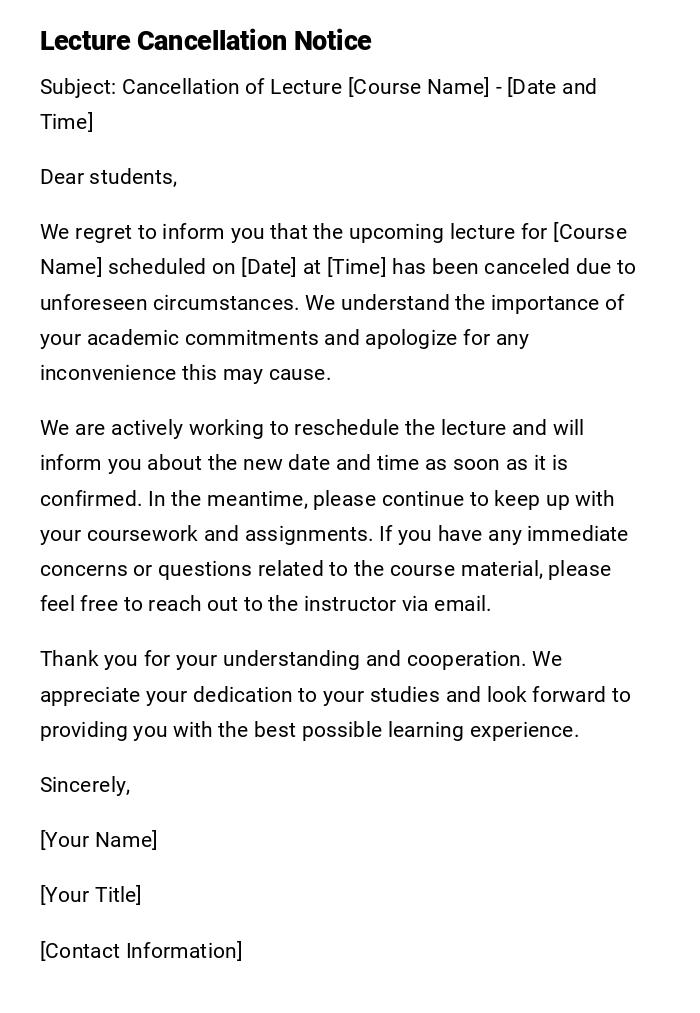
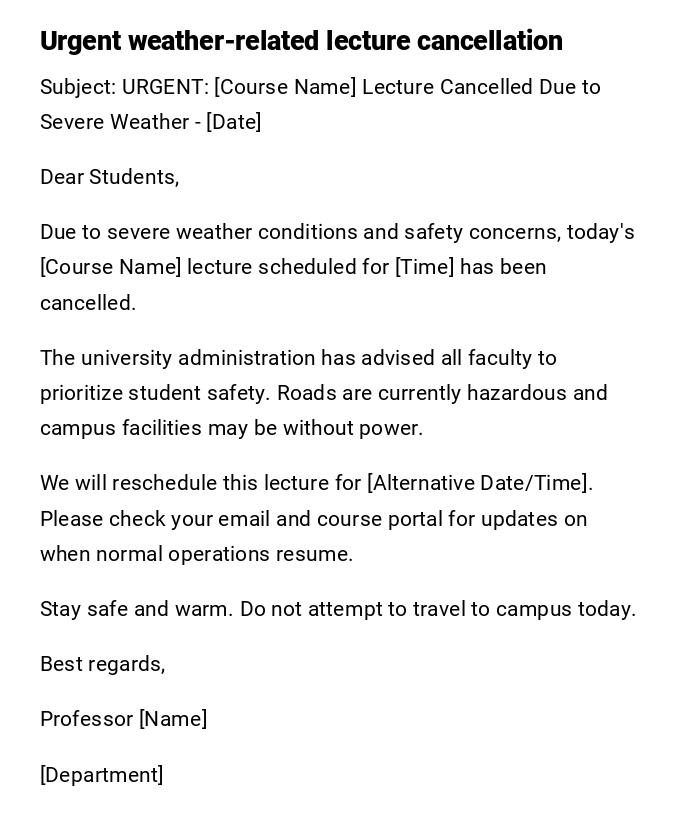
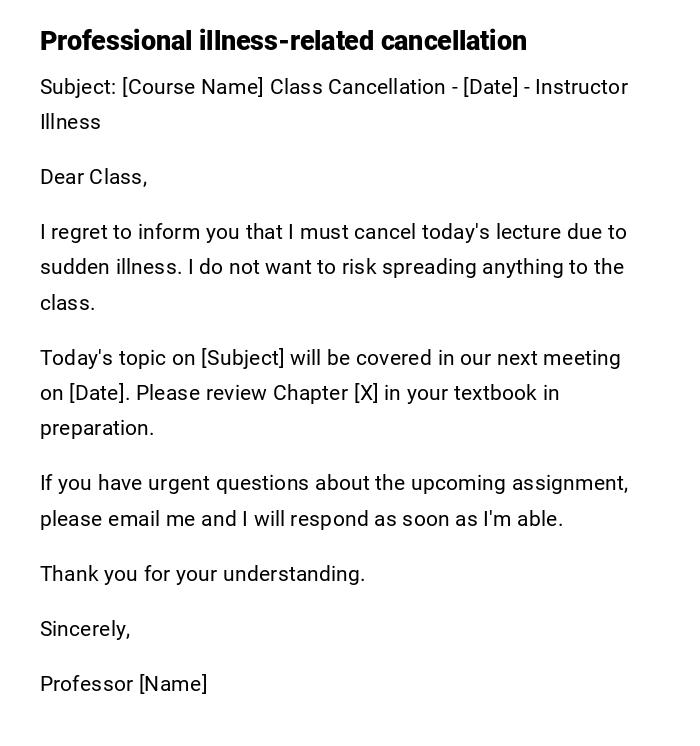
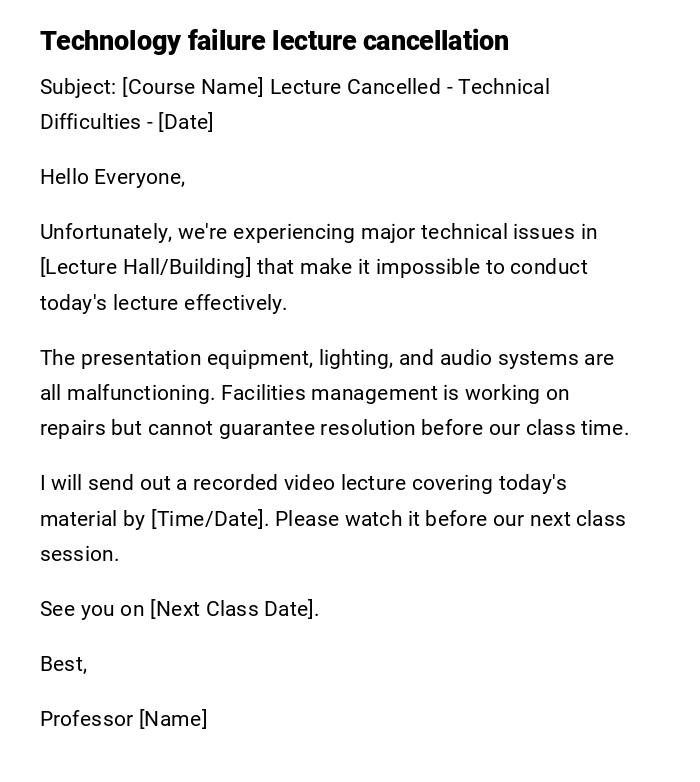
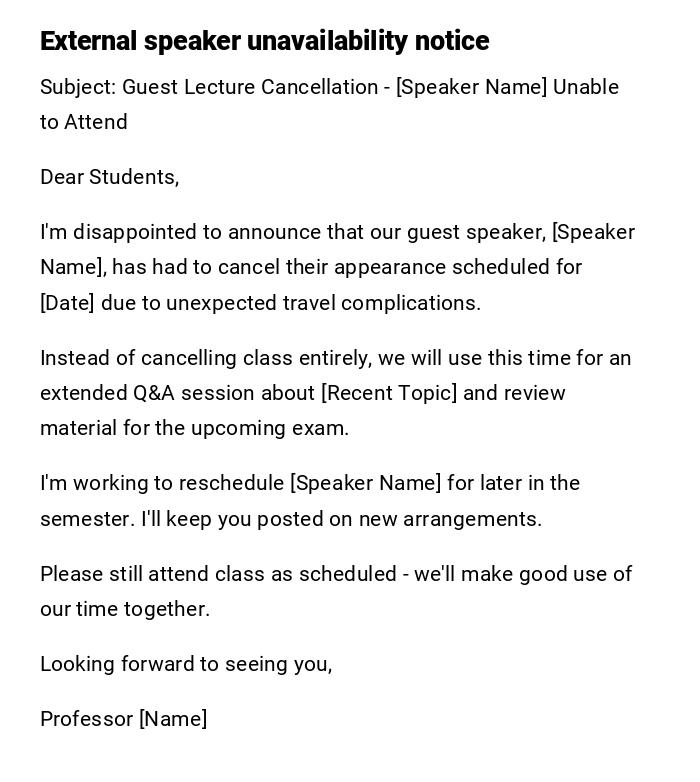
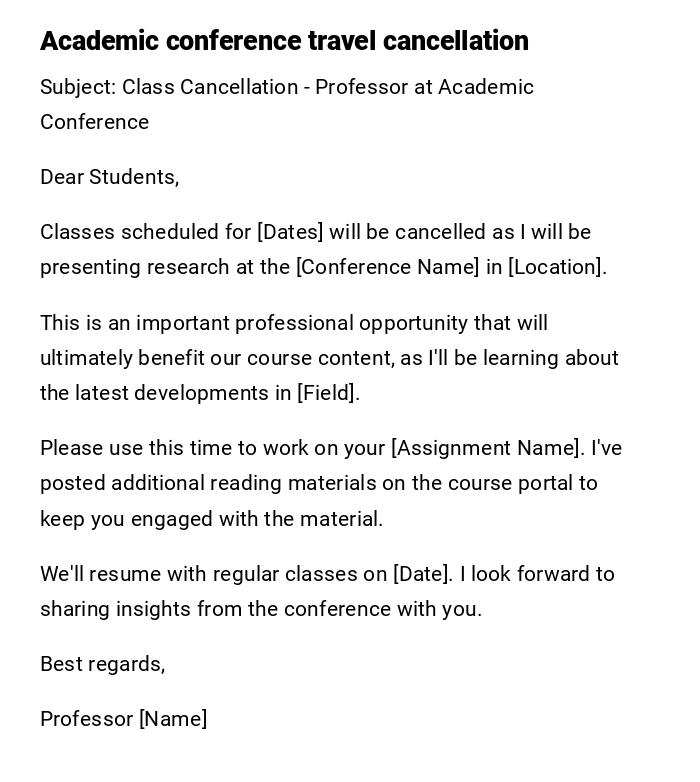
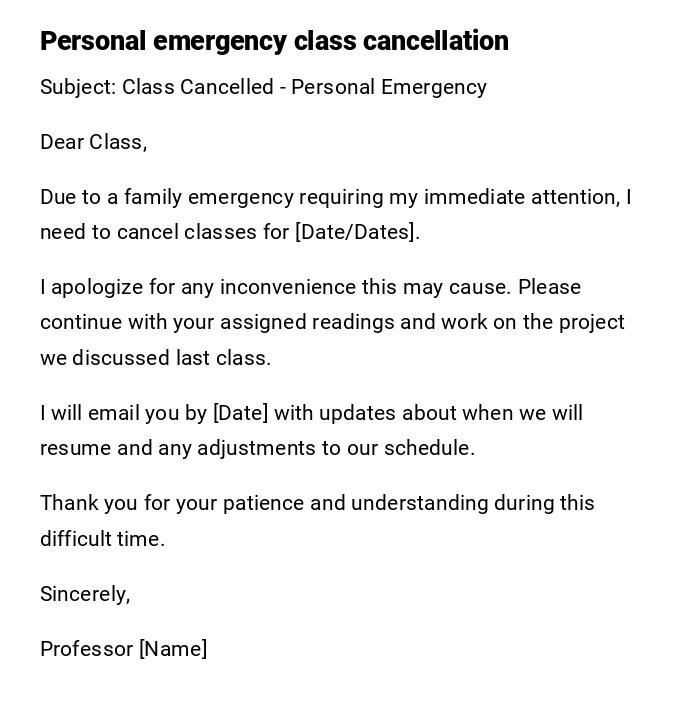
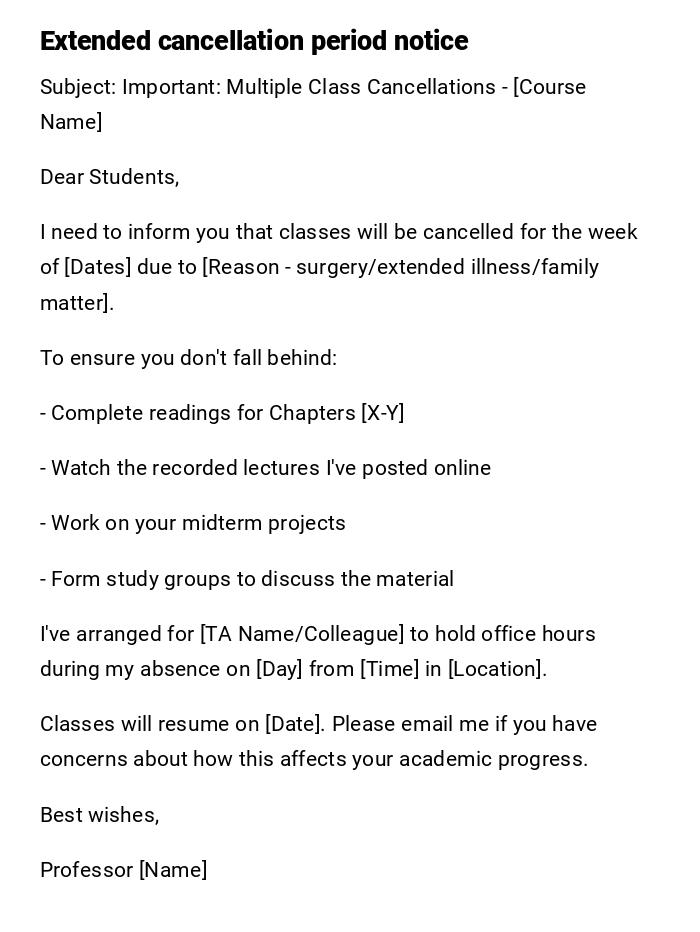
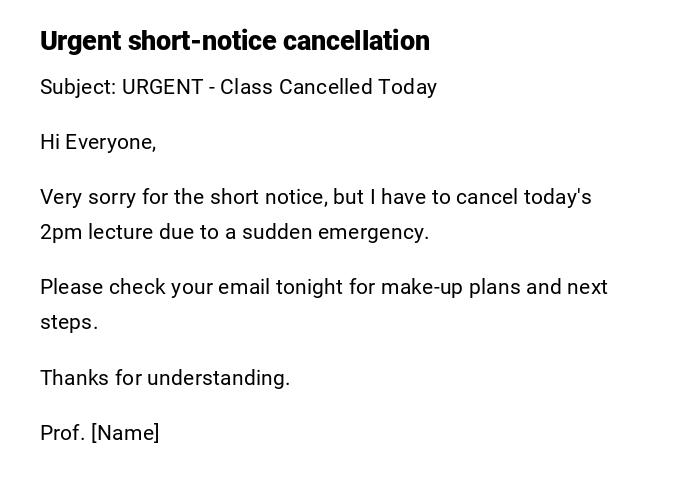

 Download Word Doc
Download Word Doc
 Download PDF
Download PDF